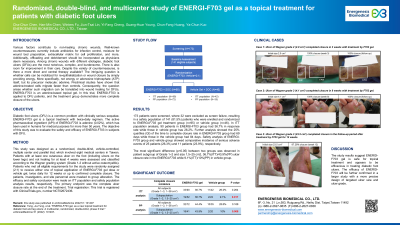Clinical Research
(CR-010) Randomized, double-blind, and multicenter study of ENERGI-F703 gel as a topical treatment for patients with diabetic foot ulcers
Friday, April 28, 2023
7:15 PM - 8:30 PM East Coast USA Time

Han-Min Chen, Ph. D. – Energenesis Biomedical Co. Ltd; Jiun-Tsai Lin, Ph. D. – Energenesis Biomedical Co. Ltd.; Yi-Fang Cheng, Ph. D. – Energenesis Biomedical Co. Ltd.; Guang-Huar Young, Ph. D. – Energenesis Biomedical Co. Ltd.; Chun-Fang Huang, Ph. D. – Energenesis Biomedical Co. Ltd.; Ya-Chun Kuo, MS – Energenesis Biomedical Co. Ltd.
Introduction: Diabetic foot ulcers (DFU) is a common problem with clinically serious sequelae. ENERGI-F703 gel is a topical treatment with twice-daily regimen. The active pharmaceutical ingredient (API) of ENERGI-F703 is adenine (0.02%), which has been used in humans for medical purposes for more than 50 years. The objective of this study was to evaluate the safety and efficacy of ENERGI-F703 in subjects with DFU.
Methods: This study was designed as a randomized, double-blind, vehicle-controlled, multiple center and parallel trial, which involved eight medical centers in Taiwan. Patients with at least one cutaneous ulcer on the foot (including ulcers on the lower legs) and not healing for at least 4 weeks were assessed and classified according to the Wagner grading system (Grade 1-3 without active osteomyelitis). Patients who met all eligible requirements for the study were randomly assigned (2:1) to receive either one of topical application of ENERGI-F703 gel dose or vehicle gel, twice daily for 12 weeks or up to confirmed complete closure. The patients, investigators, and site personnel were masked to group allocation. The efficacy and safety conclusion were made on ITT population and safety population analysis results, respectively. The primary endpoint was the complete ulcer closure rate at the end of the treatment. Trial registration: this trial is registered with ClinicalTrials.gov, number NCT02672436.
Results: 173 patients were screened, where 32 were excluded as screen failure, resulting in a safety population of 141 (81.5%) patients who were enrolled and randomized to ENERGI-F703 gel treatment group (n=95) or vehicle group (n=46). In ITT population analysis, 90 patients in ENERGI-F703 group had 36.7% in response rate while those in vehicle group has 26.2%. Further analysis showed the 25% quartiles (QI) of the time to complete closure rate in ENERGI-F703 group had 69 days while those in the vehicle group had 84 days. Safety analysis of ENERGI-F703 group and vehicle group showed comparative incidence of serious adverse events of 25 patients (26.3%) and 11 patients (23.9%), respectively. There were 5 deaths reported during the study, which were considered unrelated to the treatment.
Discussion: The study results suggest ENERGI-F703 gel is safe for topical treatment and appears to be efficacious in treating diabetic foot ulcers. The efficacy of ENERGI-F703 will be further confirmed in a larger study with a more precise design of targeted ulcer size and ulcer grade.
Remark: this study was published in EClinicalMedicine 2022;51: 101497.
Methods: This study was designed as a randomized, double-blind, vehicle-controlled, multiple center and parallel trial, which involved eight medical centers in Taiwan. Patients with at least one cutaneous ulcer on the foot (including ulcers on the lower legs) and not healing for at least 4 weeks were assessed and classified according to the Wagner grading system (Grade 1-3 without active osteomyelitis). Patients who met all eligible requirements for the study were randomly assigned (2:1) to receive either one of topical application of ENERGI-F703 gel dose or vehicle gel, twice daily for 12 weeks or up to confirmed complete closure. The patients, investigators, and site personnel were masked to group allocation. The efficacy and safety conclusion were made on ITT population and safety population analysis results, respectively. The primary endpoint was the complete ulcer closure rate at the end of the treatment. Trial registration: this trial is registered with ClinicalTrials.gov, number NCT02672436.
Results: 173 patients were screened, where 32 were excluded as screen failure, resulting in a safety population of 141 (81.5%) patients who were enrolled and randomized to ENERGI-F703 gel treatment group (n=95) or vehicle group (n=46). In ITT population analysis, 90 patients in ENERGI-F703 group had 36.7% in response rate while those in vehicle group has 26.2%. Further analysis showed the 25% quartiles (QI) of the time to complete closure rate in ENERGI-F703 group had 69 days while those in the vehicle group had 84 days. Safety analysis of ENERGI-F703 group and vehicle group showed comparative incidence of serious adverse events of 25 patients (26.3%) and 11 patients (23.9%), respectively. There were 5 deaths reported during the study, which were considered unrelated to the treatment.
Discussion: The study results suggest ENERGI-F703 gel is safe for topical treatment and appears to be efficacious in treating diabetic foot ulcers. The efficacy of ENERGI-F703 will be further confirmed in a larger study with a more precise design of targeted ulcer size and ulcer grade.
Remark: this study was published in EClinicalMedicine 2022;51: 101497.

.png)